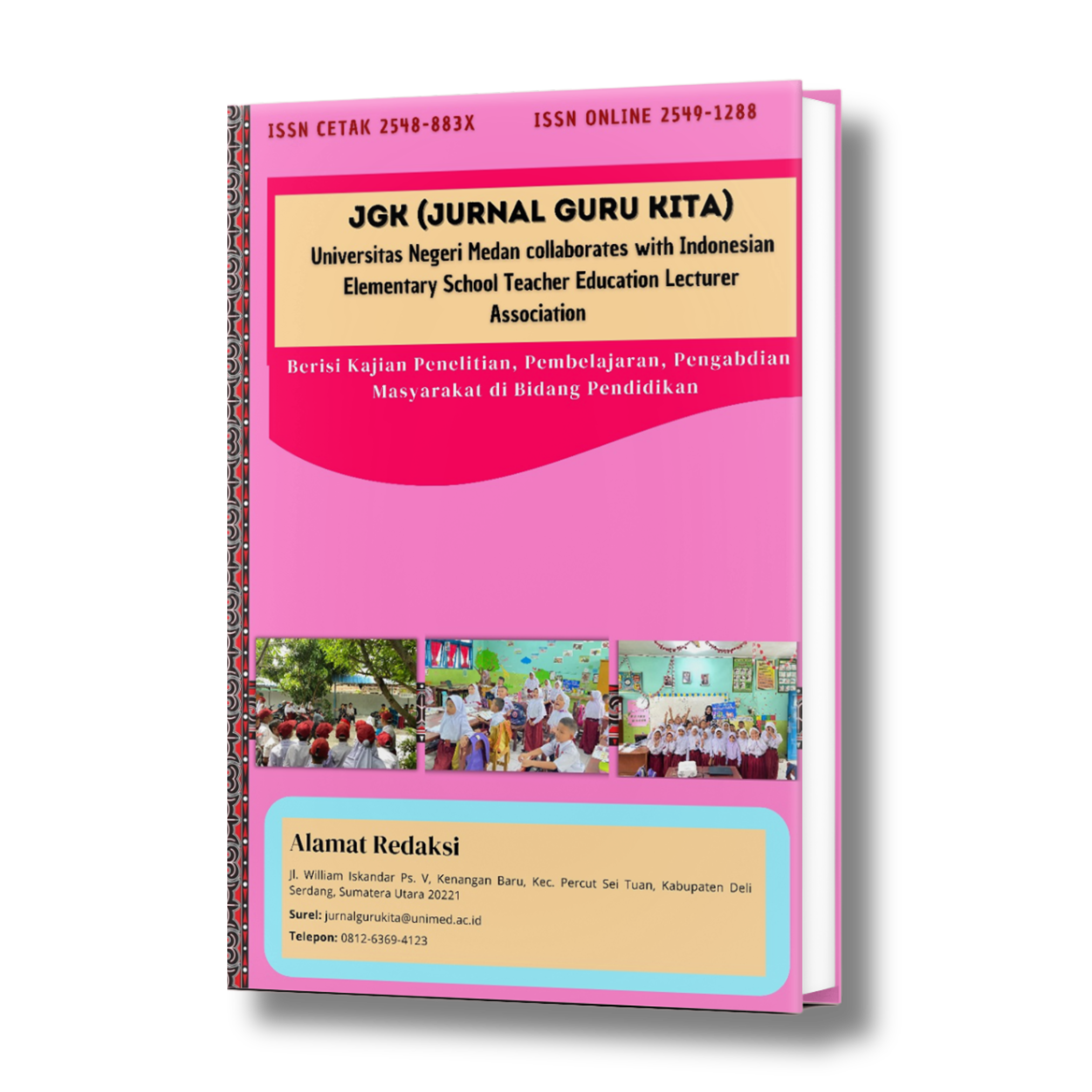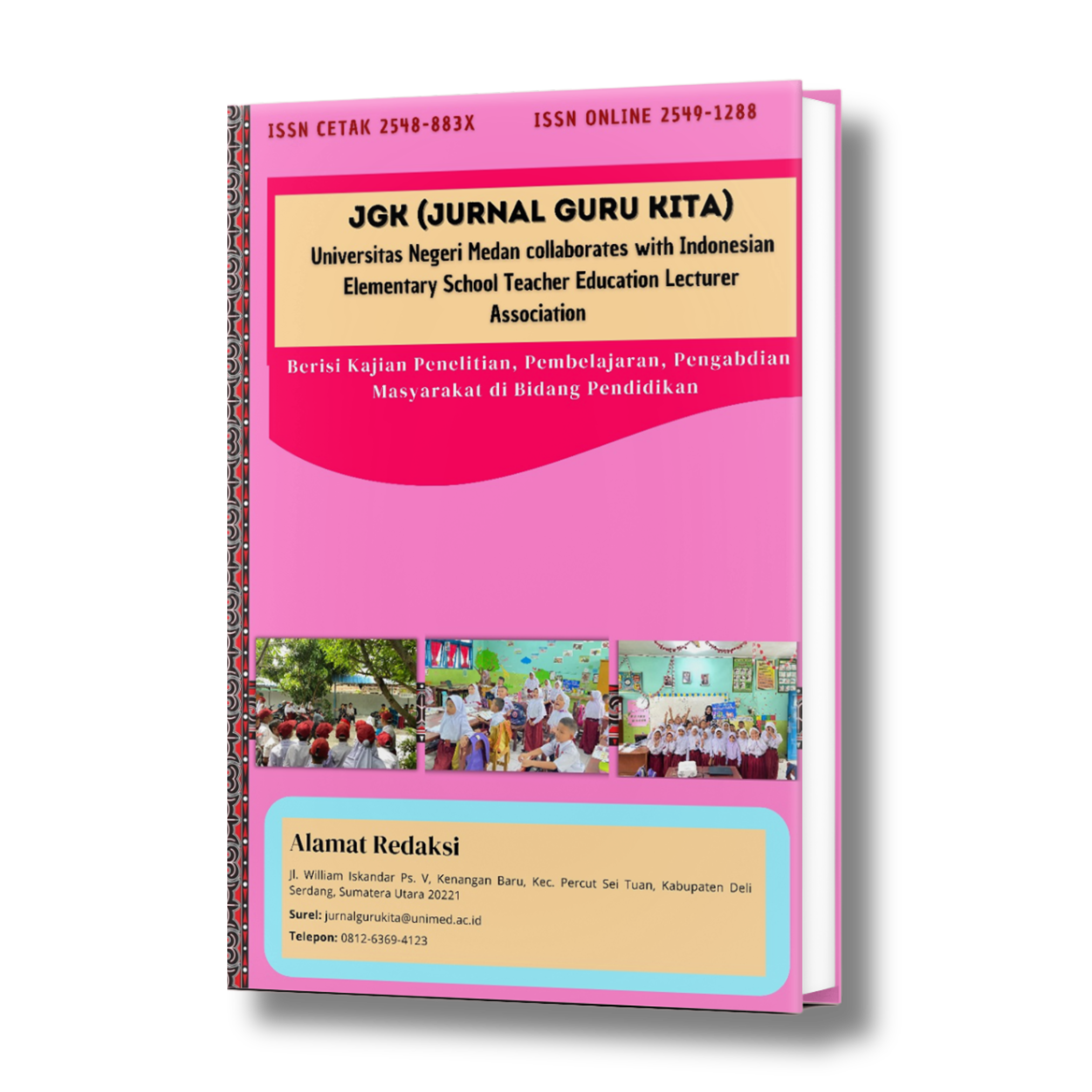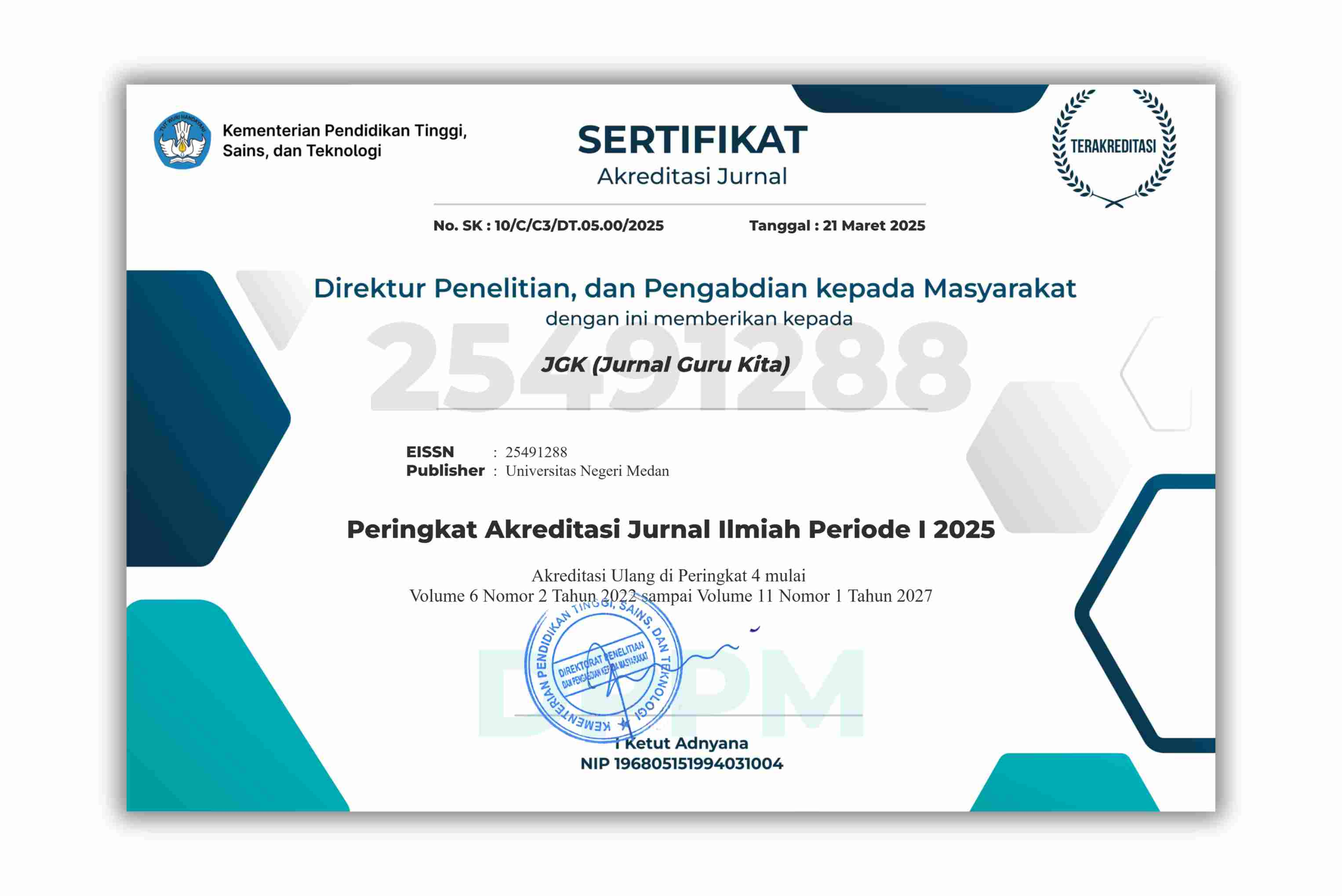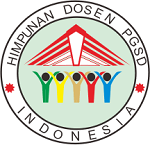Penerapan Model Kooperatif Tipe NHT Berbantuan Augmented Reality untuk Meningkatkan Minat dan Motivasi Belajar Siswa
DOI:
https://doi.org/10.24114/jgk.v9i4.70251Keywords:
Minat Belajar, Motivasi Belajar, NHT, Augmented Reality, IPASAbstract
Penelitian ini bertujuan untuk meningkatkan minat dan motivasi belajar siswa kelas IV SD Negeri 1 Binangun pada mata pelajaran IPAS melalui penerapan model pembelajaran kooperatif tipe Numbered Heads Together (NHT) berbantuan media Augmented Reality (AR). Penelitian ini merupakan Penelitian Tindakan Kelas (PTK) dengan model Kemmis dan McTaggart yang dilaksanakan dalam dua siklus, masing-masing terdiri atas tahap perencanaan, pelaksanaan, observasi, dan refleksi. Data dikumpulkan melalui observasi, angket, dan dokumentasi untuk menilai keterlibatan, antusiasme, serta dorongan belajar siswa selama proses pembelajaran berlangsung. Analisis data dilakukan secara kuantitatif dengan menghitung persentase peningkatan indikator minat dan motivasi belajar, serta secara kualitatif dengan mendeskripsikan perubahan perilaku dan respons siswa. Hasil penelitian menunjukkan adanya peningkatan signifikan pada minat dan motivasi belajar siswa setelah diterapkan model NHT berbantuan media AR. Nilai observasi minat belajar meningkat dari 74% menjadi 89,5%, sedangkan motivasi belajar meningkat dari 83% menjadi 87,5%. Peningkatan yang konsisten di setiap siklus membuktikan bahwa kombinasi antara pembelajaran kooperatif dan teknologi interaktif menciptakan suasana belajar yang lebih menarik, kolaboratif, dan bermakna. Dengan demikian, model NHT berbantuan AR terbukti efektif meningkatkan kualitas pembelajaran IPAS di sekolah dasar dan dapat direkomendasikan sebagai strategi inovatif dalam implementasi Kurikulum Merdeka.References
Al-Said, K. (2023). Influence of teacher on student motivation: Opportunities to increase motivational factors during mobile learning. Education and Information Technologies, 28(10), 13439–13457. https://doi.org/10.1007/s10639-023-11720-w
AlGerafi, M. A. M. … Wijaya, T. T. (2023). Unlocking the Potential: A Comprehensive Evaluation of Augmented Reality and Virtual Reality in Education. Electronics, 12(18), 3953. https://doi.org/10.3390/electronics12183953
An, F. … Xi, L. (2022). Relationship between perceived teacher support and learning engagement among adolescents: Mediation role of technology acceptance and learning motivation. Frontiers in Psychology, 13. https://doi.org/10.3389/fpsyg.2022.992464
Arikunto. (2017). Pengembangan Instrumen Penelitian dan Penilaian Program. Pustaka Belajar.
Arikunto, S. (2014). Metode penelitian kuantitatif, kualitatif, dan kombinasi (mixed methods). Bandung : Alfabeta.
Arikunto, S. (2021). Penelitian tindakan kelas: Edisi revisi. Bumi Aksara.
Astutik, P., & Wulandari, S. S. (2020). Analisis Model Pembelajaran Number Head Together Dalam Meningkatkan Keaktifan Siswa. Jurnal Pendidikan Administrasi Perkantoran (JPAP), 9(1), 154–168. https://doi.org/10.26740/jpap.v9n1.p154-168
Bhardwaj, V. … Pandey, V. (2025). Redefining learning: student-centered strategies for academic and personal growth. Frontiers in Education, 10. https://doi.org/10.3389/feduc.2025.1518602
Chiu, T. K. F. … Ismailov, M. (2023). Teacher support and student motivation to learn with Artificial Intelligence (AI) based chatbot. Interactive Learning Environments, 1–17. https://doi.org/10.1080/10494820.2023.2172044
Darling-Hammond, L. (2021). Defining teaching quality around the world. European Journal of Teacher Education, 44(3), 295–308. https://doi.org/10.1080/02619768.2021.1919080
Dewaele, J.-M., & Li, C. (2021). Teacher enthusiasm and students’ social-behavioral learning engagement: The mediating role of student enjoyment and boredom in Chinese EFL classes. Language Teaching Research, 25(6), 922–945. https://doi.org/10.1177/13621688211014538
Galu Wati … Edy Heriyanto. (2024). THE INFLUENCE OF THE NUMBERED HEADS TOGETHER (NHT) COOPERATIVE LEARNING MODEL ON STUDENT LEARNING OUTCOMES. Esteem Journal of English Education Study Programme, 7(1), 318–330. https://doi.org/10.31851/esteem.v7i1.15748
Gan, Z. … Liu, F. (2021). Teacher Feedback Practices, Student Feedback Motivation, and Feedback Behavior: How Are They Associated With Learning Outcomes? Frontiers in Psychology, 12. https://doi.org/10.3389/fpsyg.2021.697045
Gumasing, M. J. J., & Castro, F. M. F. (2023). Determining Ergonomic Appraisal Factors Affecting the Learning Motivation and Academic Performance of Students during Online Classes. Sustainability, 15(3), 1970. https://doi.org/10.3390/su15031970
Guo, J.-P. … Gan, Y.-J. (2022). Academic self-concept, perceptions of the learning environment, engagement, and learning outcomes of university students: relationships and causal ordering. Higher Education, 83(4), 809–828. https://doi.org/10.1007/s10734-021-00705-8
Hajirasouli, A., & Banihashemi, S. (2022). Augmented reality in architecture and construction education: state of the field and opportunities. International Journal of Educational Technology in Higher Education, 19(1), 39. https://doi.org/10.1186/s41239-022-00343-9
Haryanti, I. … Nugroho, A. (2023). Analisis Kebutuhan Media Pembelajaran Perilaku Hidup Bersih Dan Sehat (Phbs) Berbasis Video Pada Pembelajaran 5 Untuk Kelas Ii Sekolah Dasar. Jemani (Jurnal Pendidikan Jasmani), 7(01).
Hendrickson, P. (2021). Effect of Active Learning Techniques on Student Excitement, Interest, and Self-Efficacy. Journal of Political Science Education, 17(2), 311–325. https://doi.org/10.1080/15512169.2019.1629946
Lai, C. … Qi, X. (2024). Individual interest, self‐regulation, and self‐directed language learning with technology beyond the classroom. British Journal of Educational Technology, 55(1), 379–397. https://doi.org/10.1111/bjet.13366
Lilian, A. (2022). Motivational beliefs, an important contrivance in elevating digital literacy among university students. Heliyon, 8(12), e11913. https://doi.org/10.1016/j.heliyon.2022.e11913
Nugroho, A. (2023). IMPLEMENTATION OF DIFFERENTIATED LEARNING AT ARCAWINANGUN ELEMENTARY SCHOOL BANYUMAS. Proceeding Internasional Conference on Child Education, 1(1), 389–399.
Owan, V. J. … Okon, S. (2022). Innate ability, health, motivation, and social capital as predictors of students’ cognitive, affective and psychomotor learning outcomes in secondary schools. Frontiers in Psychology, 13. https://doi.org/10.3389/fpsyg.2022.1024017
Pardamean, B. … Anugrahana, A. (2022). AI-Based Learning Style Prediction in Online Learning for Primary Education. IEEE Access, 10, 35725–35735. https://doi.org/10.1109/ACCESS.2022.3160177
Renninger, K. A., & Hidi, S. E. (2022). Interest development, self-related information processing, and practice. Theory Into Practice, 61(1), 23–34. https://doi.org/10.1080/00405841.2021.1932159
Schweder, S., & Raufelder, D. (2022). Students’ interest and self-efficacy and the impact of changing learning environments. Contemporary Educational Psychology, 70, 102082. https://doi.org/10.1016/j.cedpsych.2022.102082
Sheffler, P. … Wu, R. (2022). Cognitive and metacognitive, motivational, and resource considerations for learning new skills across the lifespan. WIREs Cognitive Science, 13(2). https://doi.org/10.1002/wcs.1585
Shorey, S. … Ang, E. (2021). Learning styles, preferences and needs of generation Z healthcare students: Scoping review. Nurse Education in Practice, 57, 103247. https://doi.org/10.1016/j.nepr.2021.103247
Sugiyono, S. (2022). Metode Penelitian Kuantitatif, Kualitatif Dan R&D. Alfabeta.
Vuyk, A. … Barrios, L. (2024). Boredom and its perceived impact in adolescents with exceptional mathematical talent: a sequential mixed-methods study in Paraguay. Frontiers in Sociology, 9. https://doi.org/10.3389/fsoc.2024.1214878
Wulandari, E. R. N. … Alfarhisi, Z. P. (2025). Metode Penelitian Terapan: Implementasinya dalam Pendidikan Vokasi. PT. Sonpedia Publishing Indonesia.
Yan, X. … Cui, G. (2023). Perceived Teacher Enthusiasm and Professional Commitment: The Mediating Role of Boredom and Learning Engagement. Psychology Research and Behavior Management, Volume 16, 1149–1163. https://doi.org/10.2147/PRBM.S400137
Downloads
Published
How to Cite
Issue
Section
License
Copyright (c) 2025 Khikmatul Apriliyani, Agung Nugroho

This work is licensed under a Creative Commons Attribution-ShareAlike 4.0 International License.
Authors published with the JGK (Jurnal Guru Kita) agree to the following terms:
- Authors retain copyright and grant the journal the right of first publication with the work simultaneously licensed under a Creative Commons Attribution License (CC BY-SA 4.0) that allows others to share the work with an acknowledgment of the work's authorship and initial publication in this journal.
- Authors are able to enter into separate, additional contractual arrangements for the non-exclusive distribution of the journal's published version of the work (e.g., post it to an institutional repository or publish it in a book), with an acknowledgment of its initial publication in this journal.
- Authors are permitted and encouraged to post their work online (e.g., in institutional repositories or on their website) prior to and during the submission process, as it can lead to productive exchanges, as well as earlier and greater citation of published work. (See The Effect of Open Access)

























